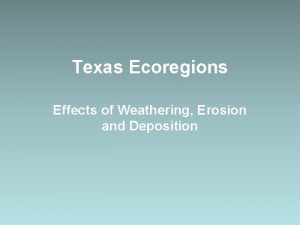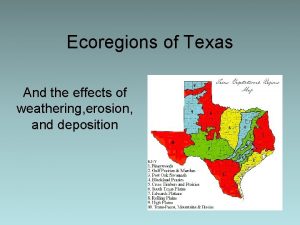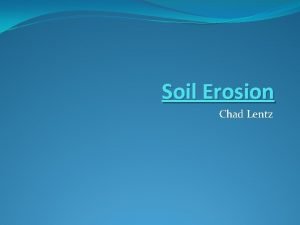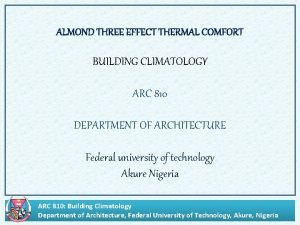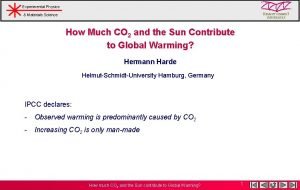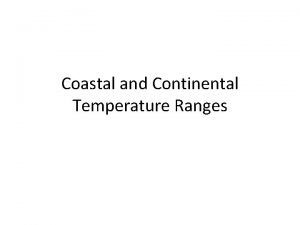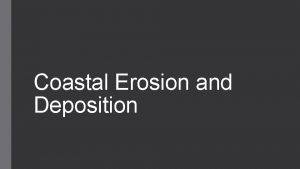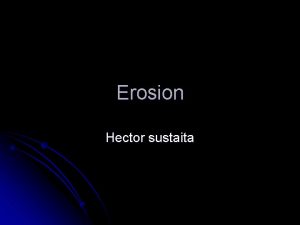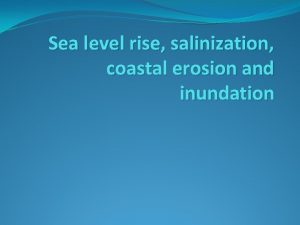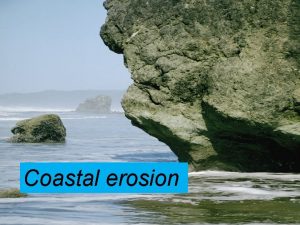Alaskan Coastal Climatology Workshop Coastal Erosion and Inundation







- Slides: 7

Alaskan Coastal Climatology Workshop Coastal Erosion and Inundation Thomas R. Karl Director, National Climatic Data Center (NCDC) Climate Observations and Analysis (COA)Program Manager Anchorage, AK August 2 -3, 2005 Where IOOS Meets the Land Atmosphere: Assessing/Mitigating Risks of Current & Prospective Coastal Inundation/Erosion

Alaskan Coastal Climatologies Climate Goal Contribution Ø Objective: Provide historical information and future scenarios regarding wave and storm surge run-up along Alaskan coastlines. Ø Initial Focus: Develop climatologies addressing near shore retreat of sea ice, permafrost loss, and sea level rise and related impacts on coastal erosion due to increased coastal wave and storm surge action. Where IOOS Meets the Land Atmosphere: Assessing/Mitigating Risks of Current & Prospective Coastal Inundation/Erosion

Alaskan Coastal Climatologies Development of Alaskan Coastal Climatologies Ø Critical need in Alaska for analysis and access to enhanced climatic and meteorological information to better understand, predict, and manage the effects of climate warming trends in the Arctic and the subsequent impacts due to changes in the frequency and severity of extreme events, sea level rise, shoreline sea ice conditions (extent and duration), near shore wave activity, and shore line erosion and flooding. Ø Purpose is to provide web-based accessibility to data resources and user-tailored applications of coastal climatology information for parameters of interest to users. Ø Highly applied objective. Ø Development of climatologies is dependent on research results and historical data. Ø Although the design of wind and wave climatologies and modeling techniques would be based on historical information, there would be a significant advantage in taking this climatic information and extrapolating it into the future. Where IOOS Meets the Land Atmosphere: Assessing/Mitigating Risks of Current & Prospective Coastal Inundation/Erosion

Alaskan Coastal Climatologies Workshop Outcomes Expectations and Deliverables Ø FY 05 (Workshop Immediate Outcomes) • Identify Theme Areas • Establish Theme Teams with designated Team Leaders • Identify potential models and ocean, atmospheric, terrestrial, and other parameters required to support the coastal wind/wave models. • Identify on-going similar work and potential partnerships • Establish a team to outline and write a Plan of Action and Milestones (POA&M) that delivers an operational support tool to Alaskan coastal planners by the end of FY 08. • Prepare a FY 06 PRIDE Proposal by October 1 for FY 06 activities needed to support FY 07 -08 activities and final operational deliverable. Where IOOS Meets the Land Atmosphere: Assessing/Mitigating Risks of Current & Prospective Coastal Inundation/Erosion

Alaskan Coastal Climatologies Proposed Plan of Action Ø FY 06 • Complete the POA&M to include FY 06, 07, and 08 high level tasks and supporting (interim) deliverables completed NLT December 1, 2005. • Assess the state of the science in coastal wind/wave climatology data, integration, and hind-cast modeling capabilities. • Assemble supporting climatological data bases for AK coastline, such as coastal sea level, coastal sea ice, near-shore winds and sea waves, offshore bathymetric and onshore topographic features, etc. • Select potential candidate coastal locations (immediate impact within the next 5 -10 years) and availability of data to support test and support the candidate models. • Develop QC procedures for AK coastal climatological data. • Integrate data bases (as required) and perform trend analyses. • Evaluate potential near-shore hind-cast wind and wave models for Alaskan shoreline ü U. S. Army Corps of Engineers in Alaska ü N. C. State University recent modeling of Alaskan coasts (briefed at ’ 05 AMS) ü U. S. Navy, NOAA, and Other wave models • Complete the climatology information resource development methodology. Where IOOS Meets the Land Atmosphere: Assessing/Mitigating Risks of Current & Prospective Coastal Inundation/Erosion

Alaskan Coastal Climatologies FOCUS This Workshop and the End Deliverable Ø Coastal Erosion and Inundation along select Alaskan Coastal areas. Ø Deliver a new operational decision support tool to Alaskan Coastal Planners Ø Do Not Duplicate • Supplement/Complement existing efforts. Where IOOS Meets the Land Atmosphere: Assessing/Mitigating Risks of Current & Prospective Coastal Inundation/Erosion

The End 10 Where IOOS Meets the Land Atmosphere: Assessing/Mitigating Risks of Current & Prospective Coastal Inundation/Erosion
